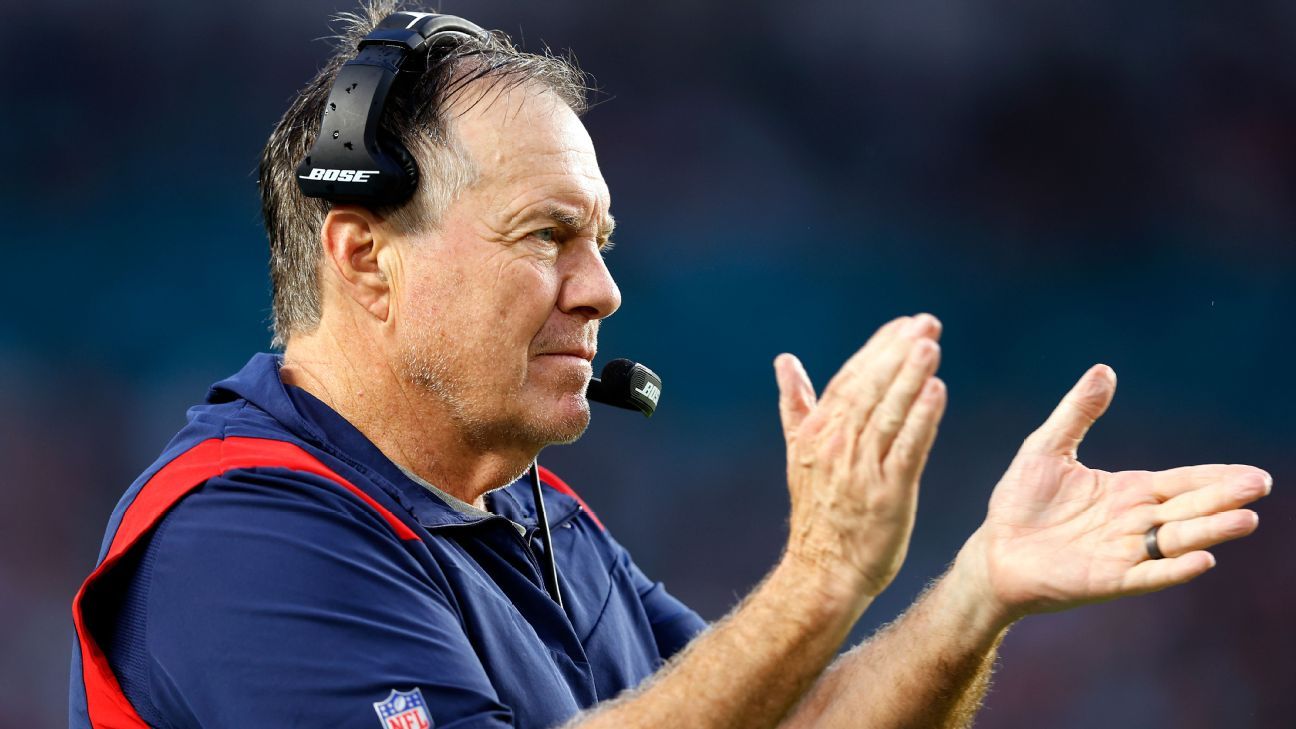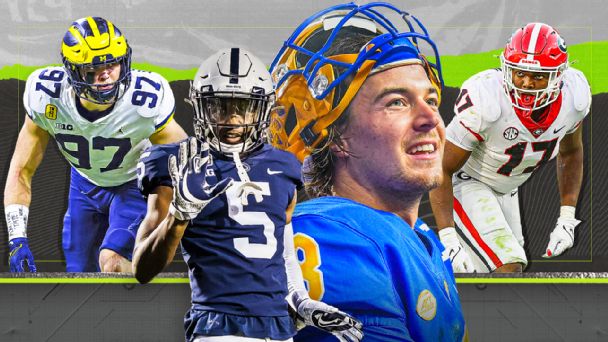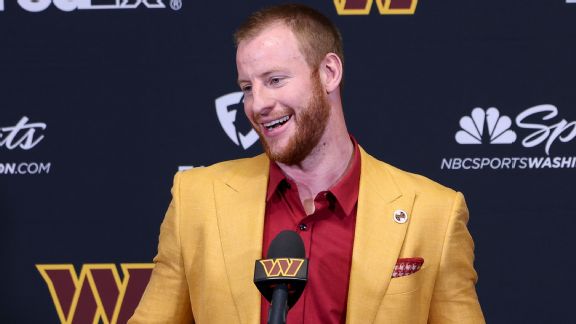
FOXBOROUGH, Mass. — Quick-hit thoughts/notes around the New England Patriots and NFL:
1. Ninkovich’s take: Rob Ninkovich played for the Patriots from 2009 to 2016 and won two Super Bowl championships, still lives in New England and thus has followed with interest Bill Belichick’s quiet approach in free agency. He makes an analogy to someone ready to jump off a diving board.
While other AFC teams like the Las Vegas Raiders (Davante Adams, Chandler Jones), Buffalo Bills (Von Miller), Los Angeles Chargers (Khalil Mack, J.C. Jackson) and Denver Broncos (Russell Wilson) are going cannonball-style, Ninkovich described the Patriots’ approach in different terms.
“They’ve made no splash. They’re straight in, like a pencil,” he said with a chuckle. “It’s kind of head-scratching a little bit. You’re saying, ‘What are they doing here?’ You’re seeing guys leave and you don’t see comparable quality coming in. You didn’t get to where you wanted to go last year, and now you’re thinking, ‘Well, how are you going to even get back to that point this year?'”
But Ninkovich himself is a good example of something Belichick has often said: There are different ways to acquire talent — free agency, trades and the draft — and it’s a year-round process.
In 2009, Ninkovich didn’t join the Patriots until the early days of training camp after he was cut by the New Orleans Saints, a decision former coach Sean Payton still laments as one of his biggest mistakes.
And that’s what Ninkovich, entering his fourth season as an ESPN football analyst, sees as the Patriots’ most realistic avenue for building on last year’s 10-8 season.
“Maybe they get some key pieces in the draft that are functional,” he said. “My only concern is that it usually takes a year or two to get yourself ready to play at a high level in the NFL for a full 17-game season.”
Ninkovich points to quarterback Mac Jones as one of the exceptions, and a silver lining in any Patriots conversation.
“You’re going into the second year with a quarterback that you have to be encouraged about, with the steps he took in his first year in the NFL. And I think Rhamondre Stevenson will be one of the better, if not one of the top three, running backs in the league based on what I saw with his strength, explosion and catch-and-run ability. I think that’s going to be a big part of the identity they have,” he said, before cautioning about notable holes to fill along the offensive line.
Ninkovich also believes the Patriots would benefit from playing with more two tight-end formations with big-money 2021 signings Jonnu Smith and Hunter Henry. That surprisingly wasn’t a big part of the approach last season.
As for the defense, Ninkovich highlights his old position.
“What they do at linebacker is going to be huge. You saw when they played teams that were really fast, or had a big catch-and-run guy out of the backfield, they had a harder time because they are bigger-bodied guys as they’ve always wanted to be more physical,” he said.
“The game is changing, faster than it’s ever been, and it’s softer than it’s ever been. So you might be able to get away with a lighter linebacker corps and still be able to play good, competitive football.”
And, of course, there’s a big hole to fill at cornerback following Jackson’s departure.
That’s a lot of uncertainty at a time Ninkovich views as critical for the franchise.
“I really think this is a vital, vital, vital offseason for them keeping up,” he said.
2:04
Marcus Spears and Rob Ninkovich disagree about the idea of Bill Belichick being the Patriots’ offensive playcaller going forward.
2. Belichick’s approach: With Belichick not publicly communicating with the fan base about coaching changes or anything else since the season ended, it has sparked curiosity on his plan.
I asked one NFL front-office staffer, with knowledge of how the Patriots operate, how they would explain what Belichick is doing this offseason, and this was their assessment:
-
He essentially did two years’ worth of free-agent shopping in 2021, hoping to capitalize on a depressed market.
-
Now he’s focused on making internal adjustments to get more out of last year’s additions.
-
That he attended the University of Georgia’s pro day on the first day of free agency probably wasn’t a coincidence — perhaps a reflection of a renewed commitment to drafting and developing after a three- or four-year dry spell in that area.
The NFL’s annual meeting is March 28-29 in Palm Beach, Florida, and that might be the first time Belichick — and owner Robert Kraft — answer questions from reporters on this topic and others.

3. Draft chips: The Patriots enter this year’s draft with seven picks (one in each of the first five rounds and two in the sixth), and given their start to free agency, my early projection is that Belichick will be motivated to trade down and accumulate more chips. NFL Network draft analyst Daniel Jeremiah called it a “really good depth draft, especially when you get into the second, third, fourth round. There’s a lot of quality there, a lot of starters.”
4. Jonnu for Jakob: Fullback Jakob Johnson played 27.9% of the snaps last season, while tight end Jonnu Smith played 46.8%. That isn’t a high enough total for Smith after he signed a four-year, $50 million contract with $31.25 million guaranteed. With Johnson joining the Raiders, it would make sense that Smith takes over some of that workload, even though they have contrasting playing styles. The Patriots easily could have re-signed Johnson (his deal included a minimum salary with just $200,000 guaranteed), and their lack of motivation to do so leads back to the idea of getting more out of Smith as a complement to Henry (68.5% playing time). Thus, it wouldn’t be a surprise if the traditional fullback isn’t as big a part of the offense in 2022.
5. Cash for Karras: Center/guard Ted Karras signing a three-year, $18 million deal with the Bengals was a case of the Patriots staying true to their financial discipline, which has been a staple of Belichick’s approach. Karras made $3 million in 2021, with New England offering a deal averaging $5 million this offseason. The Bengals pushed the market beyond the Patriots’ comfort level, with Karras set to earn $7 million in 2022, so Belichick walked away even though the offensive line now becomes a top need.
6. Trent’s status: Unlike Karras, the Patriots didn’t seem to extend much to re-sign tackle Trent Brown, despite the offensive line being a major question mark. My sense: Brown’s recent injury history loomed large, so if he returned, it would have had to be on a market-friendly deal.
7. Insurance signings: The Patriots have signed two free agents from other teams — Texans cornerback Terrance Mitchell and Saints running back/receiver Ty Montgomery — and their modest contracts indicate they aren’t locks to make the roster. What they add is experienced insurance if potential draft picks or younger players already on the roster — such as cornerback Shaun Wade, running back J.J. Taylor and receivers Kristian Wilkerson and Tre Nixon — don’t develop as hoped. Ideally, for the team, youth wins out.
8. Jakobi’s insight: Fourth-year receiver Jakobi Meyers, who was tendered at the second-round level as a restricted free agent, was a guest on Sirius XM NFL Radio last week with hosts Bob Papa and Charlie Weis. Three leftover nuggets:
-
On early influences in his career: “I think the guys who really set it off for me, I would say, were Troy Brown and Mick Lombardi. Troy actually played the position, so a lot of the things that he went through, he kind of talked to me about — what he’s seen, what he did to play so long. It’s really been great having Troy Brown around.”
-
On his rapport with Jones: “I feel like the first year was setting the foundation. We had a lot of learning experience about each other. This will be the first time I get to go back in with the same quarterback. I’m excited about the opportunity to keep growing with him. … He throws such a nice, catchable ball; it really just lays in your hands a little bit.”
-
On if he has knowledge of offensive coaching staff makeup: “No. We’ll probably all find out at the same time, honestly. I just have to hit the ground running as soon as I find out. The plan is for the [players] who were there to keep working, keep getting better, so whenever we get that structure in we’ll be ready to go regardless.”

9. Punt protection turnover: The last time the Patriots played a game, their punt protection unit included running back Brandon Bolden, snapper Joe Cardona, Johnson, personal protector Cody Davis and linebackers Jamie Collins, Jahlani Tavai, Kyle Van Noy and Brandon King. Only Tavai, Cardona and Davis are still on the roster — and Tavai might not be there when it counts.
The Patriots had three punts blocked in 2021 — part of an overall special teams performance that was well below the team’s standard — and the unit is undergoing an offseason overhaul. Also, linebacker Chase Winovich, another punt-pro contributor, was traded.
Longtime special teams captain Matthew Slater relayed that the unit’s issues from 2021 have been identified by returning coordinator Cam Achord, and: “It’s details, technique and footwork and communication. I think we’re all confident we can get that sorted out.”
New linebacker Mack Wilson projects as one addition. The Patriots hope Wilson emerges on defense like he did as a rookie in Cleveland in 2019, but at the least, he should be a factor in the kicking game.
10. Did you know? The Patriots, whose top pick is No. 21 overall, have picked in that slot six times. It ties with No. 32 as their most frequent slot among the top 32 picks. Their picks at 21: OLB Chandler Jones (Syracuse, 2012), RB Laurence Maroney (Minnesota, 2006), DT Vince Wilfork (Miami, 2004), TE Daniel Graham (Colorado, 2002), S Tim Fox (Ohio State, 1976), DB John Charles (Purdue, 1967).
